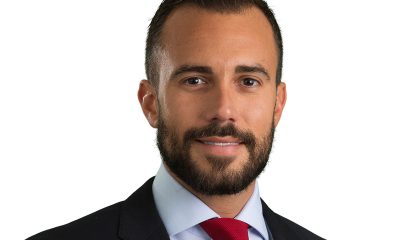World
Out in the World: LGBTQ news from Europe and Asia
Social media under pressure after a queer teenager’s died by suicide in India

Romania
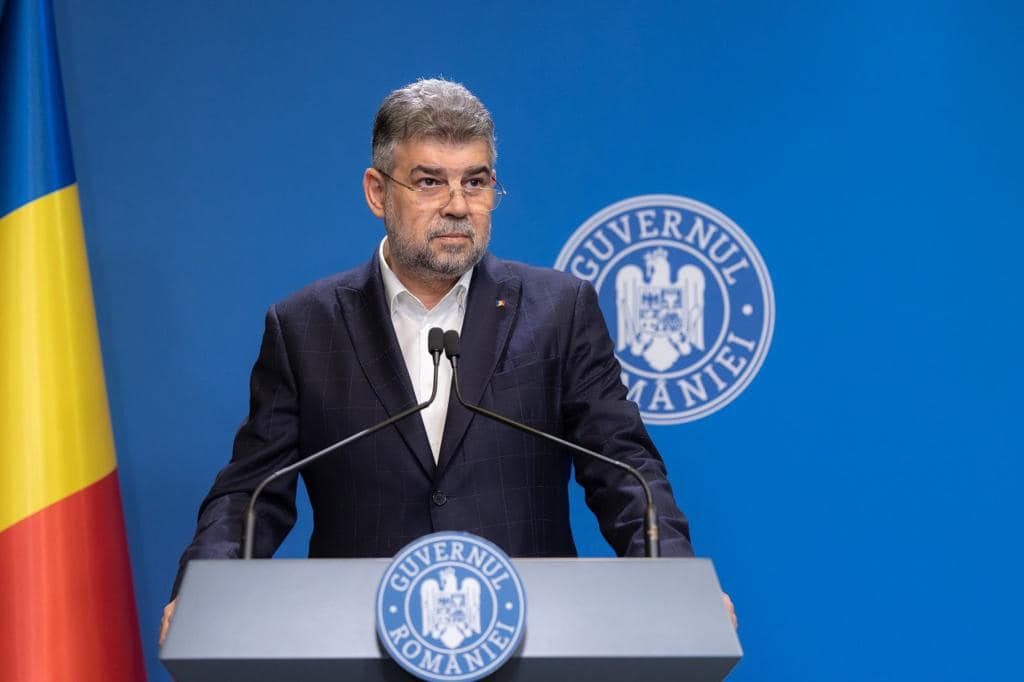
In an interview on Nov. 23 with Europa FM, Romanian Prime Minister Marcel Ciolacu, responding to a question regarding the recent European Court of Human Rights ruling that his nation was in violation of Article 8 of the European Convention on Human Rights over the issue of same-sex marriages, said that it was his belief that his fellow citizens generally are not ready to uphold the rights of same-sex couples.
The ECHR ruled this past May Romania had failed to enforce the rights of same-sex couples by refusing to recognize their relationships, in a ruling which could eventually force policymakers to expand protections for the LGBTQ community, Reuters reported.
Ciolacu, who is the leader of the Social Democratic Party, told Europa FM that “… the Romanian society is not ready for a decision at the moment. It is not one of my priorities and … I don’t think Romania is ready.”
“I am not a closed-minded person, I … have friends in relationships with a man, I don’t have a problem with that, I am talking now from the point of view of a prime minister.”
ACCEPT, the non-governmental organization in Romania that defends and promotes LGBTQ rights, disagreed with the prime minister’s assessment of the mood of the country regarding LGBTQ rights. In a statement the NGO said:
“Romanian society has embraced European values regarding human rights and demonstrates that it is ready for the adoption and implementation of a set of laws to ensure the protection and legal recognition of LGBTI families. After the sociological research carried out by Accept in 2021, a new study comes to confirm this fact.
The results of the research carried out by the Ipsos initiative in 2023 show that 51 percent of Romanians would support some form of legal recognition of LGBTI families. Moreover, the Bucharest Pride March brought over 25,000 participants to the streets this year — a record number for Romania. The figures that place the march at the top of the street protests with the highest participation in our country are telling when it comes to the solidarity and empathy with which Romanians position themselves in favor of the protection and recognition of all families.”
The government of Romania has filed an appeal of the ECHR ruling, which ACCEPT denounced saying it was “completely reprehensible the Romanian government’s action to contest this ECHR decision.”
The Vatican
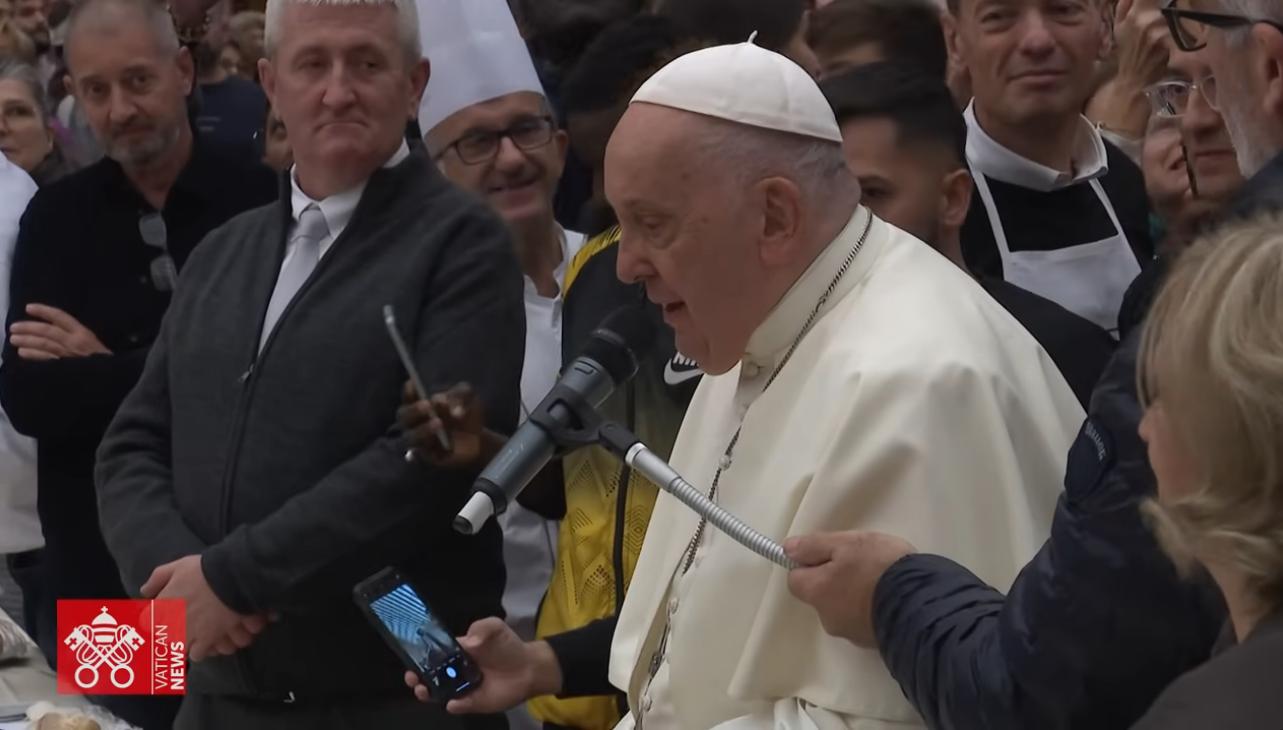
Awaiting Pope Francis after he finished his Sunday Angelus last week, guests gathered in the Paul VI Hall for a luncheon made up of the poor and their companions including a group of trans women, who all had a history of personally interacting the pontiff.
More than 1,200 people in all came for the lunch that transformed the hall into a large and unique restaurant for the customary annual lunch with Francis on the World Day of the Poor.
PinkNewsUK reported that the pontiff had invited the transgender women in order to offer them comfort and support, and ensured they received VIP treatment. In fact one of them, Claudia Vittoria Salas, a former sex worker, was seated at the table with Francis himself. Salas, who is a godparent to three of her nieces and nephews in her home country, Argentina, said she did sex work in order to put her children through school.
She told the Associated Press: “Being a godparent is a big responsibility; it’s taking the place of the mother or father. It’s not a game.”
Francis began the lunch with a blessing when he thanked the Lord for this “moment of friendship, all together,” for the meal, and for those who prepared it. The tables adorned with white and yellow flowers offered a colourful backdrop for images capturing an unforgettable moment of welcome, concern, care and love for all those who for the rest of the year live on the streets.
The Dicastery for the Service of Charity organized the event, while Hilton Hotels offered the lunch, dedicating special attention to the menu so that the meal could be enjoyed by people of various faith backgrounds present.
On the menu were cannelloni with Roman ricotta and spinach with a Parmigiano Reggiano sauce, sautéed white meatballs with a velouté of San Marzano tomatoes and basil with a cauliflower purée, followed by Tiramisu and small pastry desserts.”
Ireland
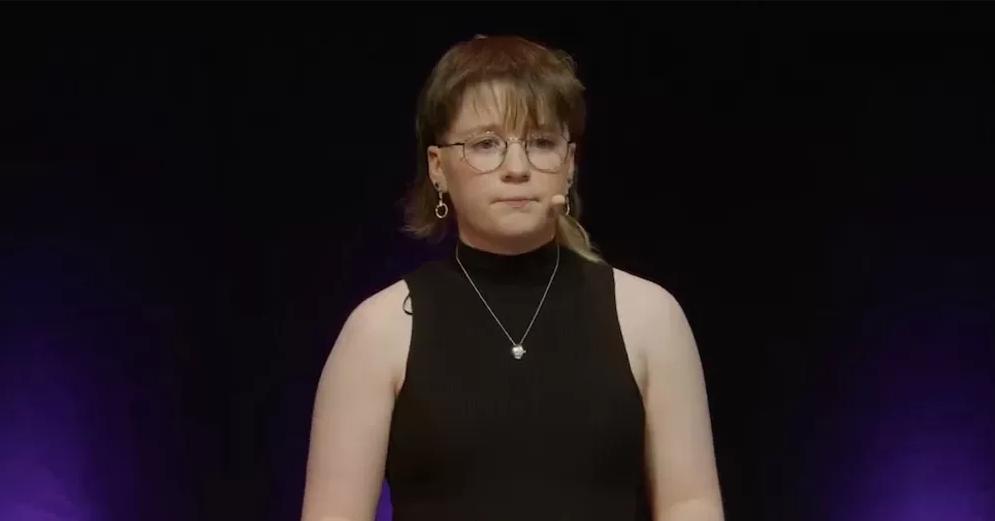
A 13-year-old trans teen from the east of Ireland, from the city of Wicklow located south of Dublin on the Irish Sea, was a keynote speaker at the 2023 Child Talks conference.
Bee Fennell, was one of six youth speakers at the Child Talks conference held at Dublin’s Helix Center for the Performing Arts, addressing the need for further education programs regarding to transgender issues facing Irish youth.
GCN, Ireland’s largest LGBTQ media outlet reported:
Among other issues discussed at the event, including STEM programs for girls and vaping, LGBTQ issues emerged as a serious concern for school-aged children through the country. Fennell used their time on stage at the Child Talks conference to discuss their experience coming out as a trans teen and the lack of resources available for trans youth in Wicklow.
“I wanted to take part in Child Talks 2023 because I wanted to share my story and hopefully encourage others to get the education to be a true ally to the community and to understand what it is like to be transgender,” said Fennell.
During their time on stage, Fennell described how they came out to their family and their school: “I was 12 when I officially came out to my parents and only a few months later, to the primary school that I was attending.”
“Coming out to my school was the biggest step, because it meant everyone knew, it wasn’t just in the house anymore. I remember that night so clearly, mam and I, sitting on the couch, typing an email that was going to change my life.
I talked about my name and gender change and explained what it meant. That email was sent around 7 p.m., outside school hours. We received a response 3.5 hours later, at 10:30 that night.”
Fennell, who uses they/them pronouns, went on to explain how their school set up a meeting to help the then 12-year-old come out to their classmates: “After a terrifying but amazing meeting with my school to discuss next steps, the day came when the teacher would tell the class about who I really was.
Me and two friends I had already come out to went to a separate room to avoid any negative reactions. After the most anxiety-filled half-hour of my life, I was walking up the steps to where my class awaited my arrival. A few friends immediately hugged and congratulated me.”
Unfortunately, as Fennell noted, not everyone’s reaction was so kind.
“Some others just stared. Shocked, confused, some even with disgusted impressions,” they said.
Thankfully, however, the vast majority of Fennell’s classmates were accepting and welcoming, leading the trans teen to report that “At that moment … I was more comfortable in my identity than I have ever been before. I was officially Bee, officially me.”
Bee went on to explain how the LGBTQ organization, BelongTo youth services, helped them discover the community that they’ve always been looking for.
“I had been alone in that fight until I walked into that [BelongTo] youth group. I always knew there was community, sure, it’s in the name. But I didn’t have anyone in my position, having gone through it. I didn’t have anyone who didn’t get confused when I simply introduced myself until I walked into that group,” Fennell concluded.
United Kingdom

An independent Regulatory Commission has imposed an action plan and significant fine on the Luton Town Football Club for misconduct in relation to crowd control at their game against Brighton and Hove Albion in the Premier League match that was held on Aug. 12.
The Football Association based at Wembley Stadium in London announced that the club has been fined £120,000 ($151,212) after homophobic chanting from fans took place during an away match against Brighton and Hove Albion.
According to the governing body, Luton Town admitted that they “failed to ensure their spectators and/or supporters (and anyone purporting to be supporters or followers) conduct themselves in an orderly fashion; and do not use words or otherwise behave in a way which is improper, offensive, abusive, indecent or insulting with either express or implied reference to sexual orientation.”
In an interview with the local newspaper, Luton Today, a spokesperson for the team said:
“As an inclusive, family-oriented club, Luton Town abhors abusive chanting such as this and has a zero-tolerance policy towards discrimination of all kinds. It is not acceptable towards anyone in football or wider society, either in person or online. Those involved were committing a criminal offense and anyone subsequently identified will be issued with a club ban and face potential police investigation.”
The club went on to note that it was working with supporters to help form the Rainbow Hatters supporters’ group for members of the LGBTQ community, who meet regularly to share their experiences of watching the Hatters.
“We will continue to promote the ‘Love Football. Protect The Game’ campaign, which this season has focused especially on fan behavior, and will work further with supporter groups to educate and inform on all forms of discriminatory acts to ensure that watching Luton Town is a safe and welcoming experience for everyone,” the club told Luton Today.
Russia
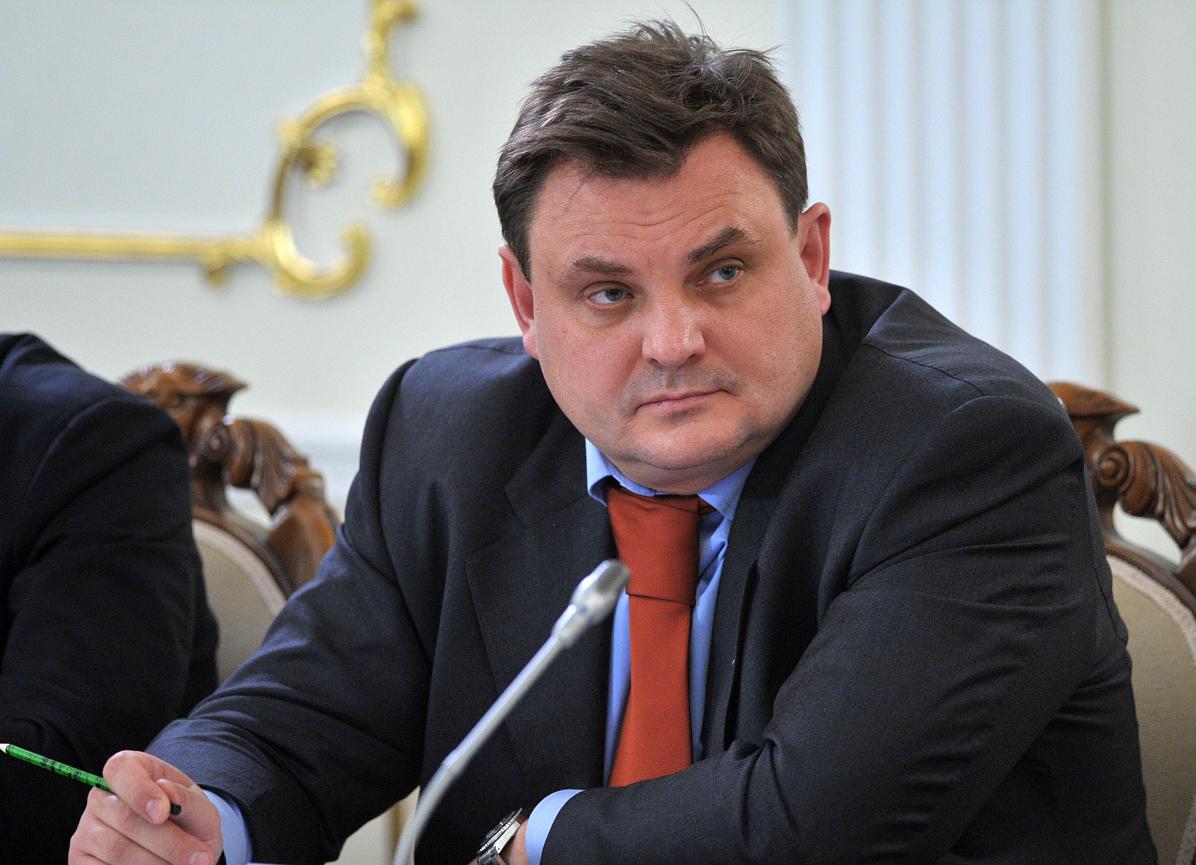
The Russian Justice Ministry has lodged an administrative legal claim with the Russian Supreme Court to recognize the global LGBTQ rights movement as extremist and ban its activity in Russia.
In a Justice Department press release, LGBTQ Russians were referred to as an “international social movement” by the Justice Minister Konstantin Chuychenko.
The ministry did not specify whether it was seeking the closure of any specific groups or organizations, or if the designation would apply more broadly to the LGBTQ community, causes and individuals, Agence France-Presse reported.
This latest action by the Russian government follows nearly 10 years of the Parliament, comprised of the State Duma, which is the lower house, and the Federation Council, which is the upper house, passing legislation attacking its LGBTQ citizens. In July of this year legislation that will effectively ban the existence of trans Russians was signed into law by President Vladimir Putin.
The law now bans Russians from changing their gender on official government identity documents including internal and external passports, driver’s licenses and birth certificates, although gender marker changes had been legal for 26 years since 1997.
Medical healthcare providers are now banned from “performing medical interventions designed to change the sex of a person,” including surgery and prescribing hormone therapy.
In December 2022, Prime Minister Mikhail Mishustin issued a decree on Christmas Eve expanding and amending Russia’s “gay propaganda” law signed by Putin. That law set fines for books or media that represented non-straight relationships.
The Justice Ministry in its statement accused the “LGBTQ movement operating on the territory of the Russian Federation” of “various signs and manifestations of extremism, including incitement to social and religious hatred.” If the court upholds the ban as passed, prosecutors will have the power to pursue “terrorism” cases against LGBTQ Russians, especially activists.
Speaking with Agence France-Presse, the head of the Sphere human rights group, which advocates for the Russian LGBTQ community, criticized the announcement.
“Russian authorities are once again forgetting that the LGBTQ+ community are human beings,” said Sphere head Dilya Gafurova, who has left Russia.
Authorities “don’t just want to erase us from the public field: They want to ban us as a social group,” Gafurova told AFP. “It’s a pretty typical move for repressive non-democratic regimes — the persecution of the most vulnerable. We will continue our fight,” he added.
The Supreme Court’s ruling is scheduled for Nov. 30.
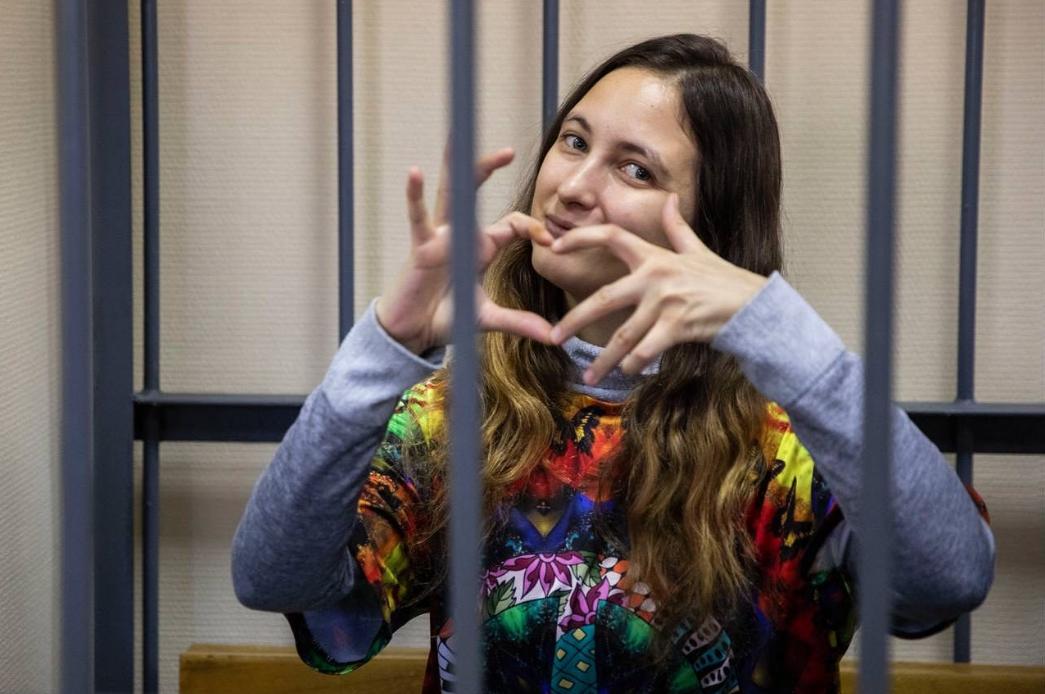
A 33-year-old lesbian artist was sentenced by a Russian court to a term of seven years in a penal camp, after she was convicted of spreading disinformation about the Russian army.
Alexandra Skochilenko, who goes by Sasha, swapped supermarket price tags with slogans criticizing Putin’s war against Ukraine. An elderly shopper reported the swapped tags to the police.
Skochilenko is just the latest among thousands of Russians who have been detained, jailed or fined for speaking out against Putin’s large-scale military operation in Ukraine that has cost the lives of tens of thousands Russian, Ukrainian troops and civilians.
Her supporters in the courtroom shouted “shame” and “we’re with you Sasha” after the judge Oksana Demiasheva read out the verdict, an AFP journalist at the sentencing reported. Skochilenko wore a colorful T-shirt with a large red heart printed on it, and she made a heart shape with her hands and smiled to supporters during the hearing.
Addressing Demiasheva, Skochilenko said:
“Your Honor! Every court sentence is a certain message to the public. You may think of this information differently than my lawyers or I do, but you will agree that I have my moral principles and that I haven’t departed from them, not by an inch. You will probably agree that I have shown courage, resilience and fearlessness. In the slang of investigators, to put someone in jail is ‘to take them prisoner.’
And I have not given up under threats of being taken prisoner, of bullying, illness and the 8-year sentence that prosecution has asked for; I have not been hypocritical; I have been honest before myself and before the court.
If you choose to convict me, what message will you send to our fellow citizens? That you have to break if you’re taken prisoner? That you have to lie, be a hypocrite, change your convictions if you face some pressure? That you can’t have pity for our soldiers? That you can’t wish for peaceful skies above our heads? Is it really what you want to say to people in times of depression, instability, crisis, and stress?
My process is widely covered in Russia and in the world; news videos and documentary films are being made, and even books are being written about it. So regardless of the verdict you deliver, you will become part of history. Perhaps you will become part of history as the person who convicted me; perhaps as the person who acquitted me; perhaps as the person who made a neutral decision and gave me a fine, a conditional sentence, or a time that I have already served. It is all in your hands, but remember: Everybody knows, everybody sees that you’re not trying a terrorist in this court. You’re not trying an extremist. You’re not even trying a political activist. You’re trying a musician, an artist and a pacifist.”
“Every person in this room wants only one thing: Peace. Why fight?” she added in her closing statement.
According to the Russian language media outlet Mediazona, federal prosecutor Alexander Gladyshev told the court: “Skochilenko compares the Russian Federation with a fascist state, they [prosecution expert witnesses] explained that in the Russian Federation now there are no elements of a fascist state. The words that Russia attacked Ukraine are false; the purpose of the SVO [special military operation] was to protect the citizens of Donbas from aggression,” Gladyshev said.
Skochilenko’s mother says her daughter suffers from health issues, including celiac disease and a congenital heart defect, adding that a long prison term would be a “catastrophe.”
India
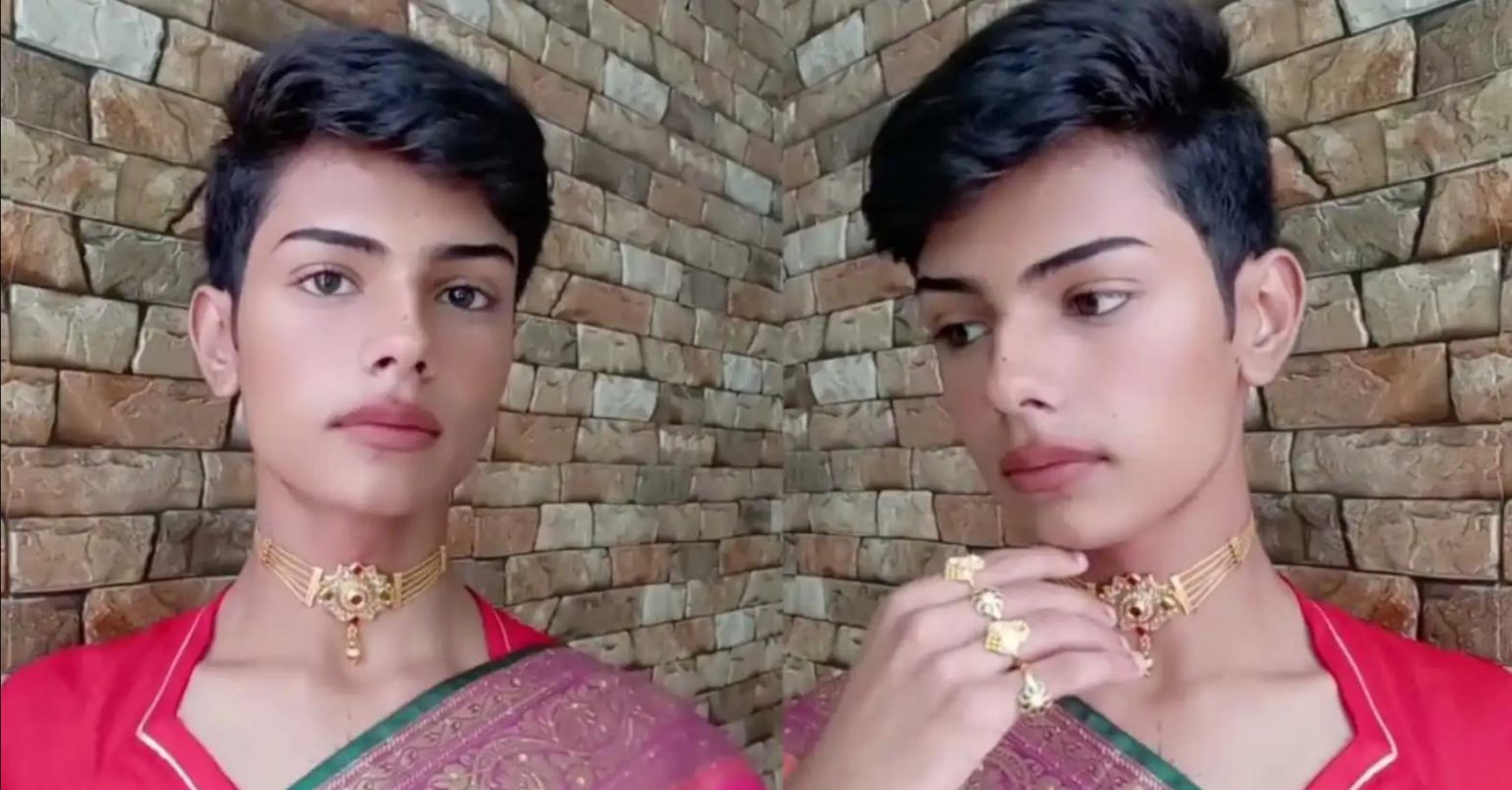
The death of a queer teenager by suicide in the ancient city of Ujjain beside the Kshipra River in the central Indian state of Madhya Pradesh has LGBTQ advocacy groups calling on social media giant Meta to address what one group, Yes, We Exist, to label as “mass bullying on Instagram.
According to the local media outlet Ujjain News, Pranshu Yadav, 16, whose Instagram account has 14,000 followers and more than 300 posts was found hanging in their bedroom on Nov. 21 by their mother who rushed the adolescent to hospital where they later died. Local police are now investigating.
Yes, We Exist highlighted how Yadav, who was attempting to build a career as a professional makeup artist, received more than 4,000 comments on a current Instagram reel, many of which were homophobic.
In the reel they were attacked for wearing a saree in a reel they posted celebrating Diwali, the Hindu festival of lights earlier this month. A saree (also spelled sari) is a an outer garment, mainly worn by women from the Indian subcontinent, that is made of about six yards long fabric. A saree, worn with a blouse or choli, is wrapped around the waist over a petticoat with the left end made to hang over the head or shoulder. A saree comes in various types of fabric, color, design and styles.
In India’s culture of toxic masculinity where LGBTQ people are still ill regarded and full equality is years away, the reaction to the queer teen’s Instagram post was almost predictable an India activist told the Washington Blade via a Telegram exchange.
Yes, We Exist now calling on Instagram, which is owned by Meta, to invest in its non-English languages and ensure cyber bullying is tackled.
“We have ourselves reported queerphobic content several times and most often no action is taken. On the contrary, when people call out bullies, they get penalized by Meta,” Jeet, the founder of Yes, We Exist, told PinkNewsUK.
Jeet added that the “tragic loss” Pranshu it is a “devastating reminder of the real-world consequences of online bullying.”
“The LGBTQIA+ community in India mourns not only the individual but also the systemic challenges we routinely face.
The call for greater accountability from platforms like Instagram and from Indian lawmakers who have not prioritized offline and online safety of our community, is urgent to ensure the well-being of young queer individuals like Pranshu.”
Thailand
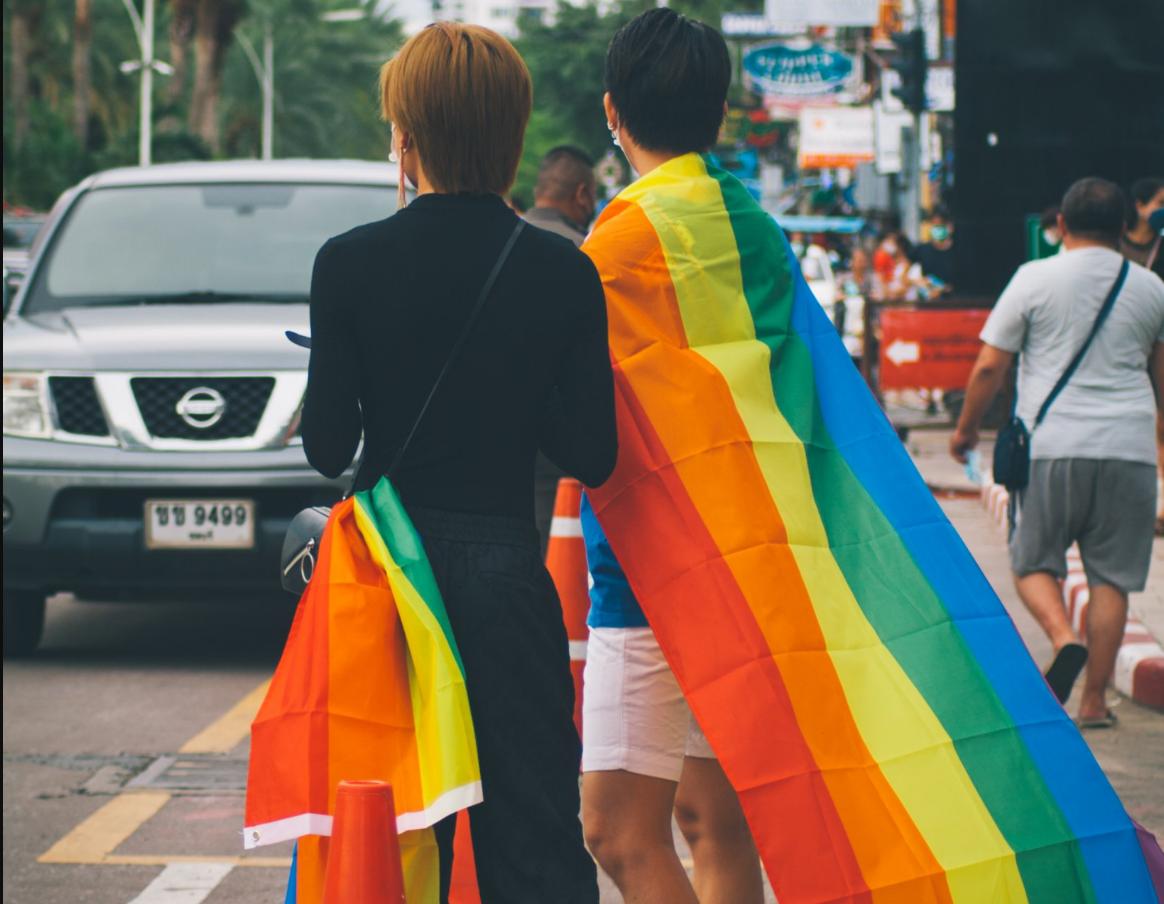
The Thailand Cabinet approved an amendment to the country’s civil code to allow same-sex marriage, with an expectation for the draft to be submitted to the National Assembly in December, the Associated Press reported.
Deputy government spokesman Karom Polpornklang said the amendment bill proposed by the Justice Ministry seeks to allow same-sex marriage with full legal rights. It will also allow members of the LGBTQ community to build families and ensure both spouses have equal rights.
Karom said the bill’s main principle is to remove the terms “men,” “women,” “wives” and “husbands” from the civil code.
The terms will be changed to “persons,” “fiancées,” “engaged couples” and “married couples,” so men can marry men and women can marry women and have the same rights as male-female unions.
The deputy spokesman said the Cabinet has also called on the Council of State to amend other laws accordingly, so the surviving spouse in a same-sex marriage is entitled to receive the inheritance left behind by their partner.
The Council of State has also been tasked with scrutinizing the same-sex marriage bill, and once that is done it will be submitted to the House, Karom said.
Thai government spokesman Chai Wacharonke said the amendment bill would be different from the Life Partnership Act that was enacted by the last government.
He said this act simply endorses the rights for same-sex couples to spend their lives together but does not provide full legal marital rights.
Additional reporting from Europa FM, PinkNewsUK, The Associated Press, Vatican Press, Mediazona, Agence France-Presse, Luton Today, GCN Ireland and Ujjain News.
Africa
Senegalese NGO claims new president discussed LGBTQ rights with top EU official
Jamra Ong Islamique demands government expedite anti-LGBTQ law
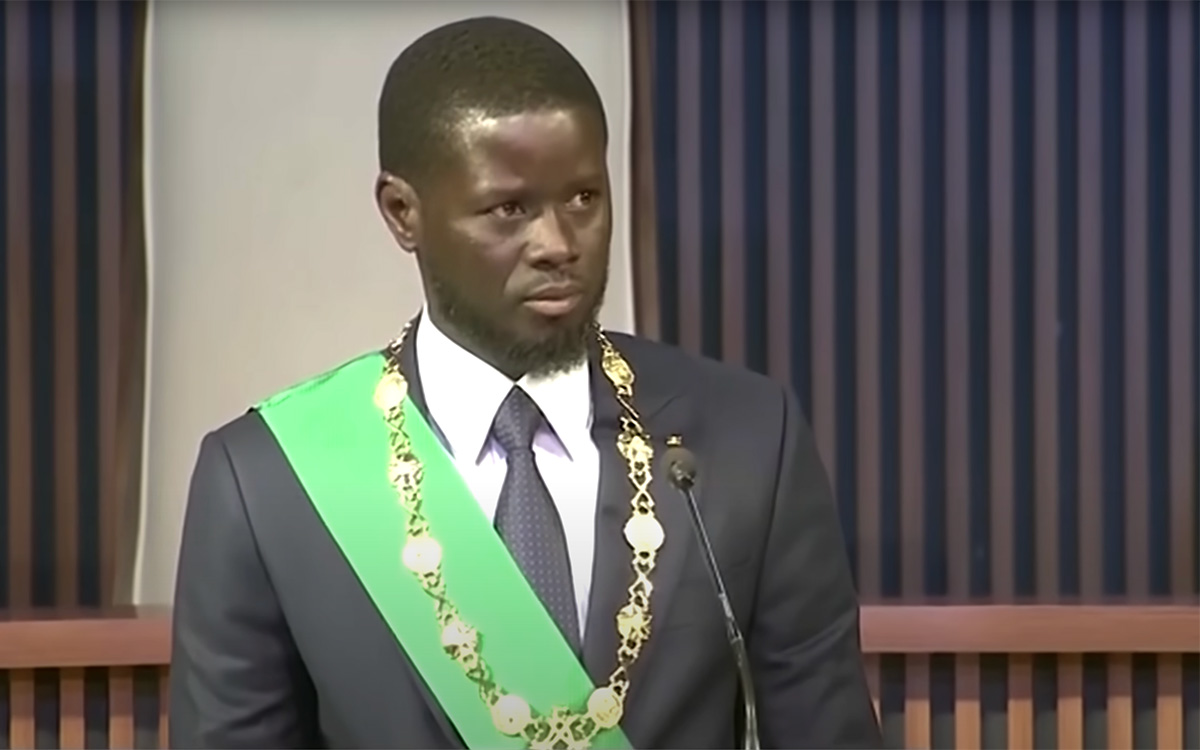
A Senegalese NGO has called on the government to expedite the process of enacting an anti-LGBTQ law after the country’s new president met with a top EU official.
Jamra Ong Islamique made the call during a press conference last Wednesday after newly elected Senegalese President Bassirou Diomaye Faye met with European Council President Charles Michel.
Mamae Makhtar Gueye of Jamra Ong Islamique claimed the meeting between the two dignitaries involved an acknowledgment of LGBTQ rights in Senegal. Gueye said Michel is an LGBTQ ally who wants to change Senegal’s cultural customs that do not condone LGBTQ rights.
“His ardent proselytism for the expansion of LGBT ideology could not leave Jamra indifferent,” said Gueye. “Countries including Gabon, Central African Republic, and Mauritius, amongst others, that underestimated the nuisance of these propagandists of homosexuality paid dearly for it because these global lobbyists ended up legalizing this abomination, so beware.”
Gueye, however, has received a lot of backlash and has been accused of not raising the same sentiments during the tenure of former President Macky Sall, who also met with Michel.
“Did he come as a defender of the LGBT cause or as a European official? Did he come to talk about LGBT rights or partnership agreement between the European Union and Senegal?,” asked Ahmadou Diaw, a Senegalese academic. “Mr. Gueye should know when to alert and when to shut up.”
Cheikh Maï Niang, a social commentator, described Jamra as a “useless organization” that is focused on restricting the freedom of the Senegalese people.
“They are absolutely good for nothing apart from eating the taxpayer’s money,” said Niang. “Where is the democracy we cry about everyday? Seems like they are here to restrict the freedom of the Senegalese people.”
“Not everyone is interested in religion,” added Niang. “We wasted too much time with these useless things. Let’s talk about developing the country. People should live their lives in the manner they want.”
Jamra has previously made proclamations against the LGBTQ community.
The organization in February — before Senegal’s presidential election that took place on March 24 — accused the EU Electoral Observation Mission to Senegal of wanting to indoctrinate Senegalese people with their pro-LGBTQ narrative.
Senegal does not have a law that specifically criminalizes those who identify as LGBTQ or advocate for them. Article 319 of the country’s penal code criminalizes consensual same-sex sexual relations with a fine and between one and five years in prison.
Some Senegalese lawmakers have sought to increase the prison sentence to 10 years for anyone convicted of engaging in homosexuality. These efforts thus far have not been successful.
Samm Jikko Yi (Together for the Safeguarding of Values), an Islamic lobby group that includes many organizations, in 2022 organized an anti-LGBTQ demonstration in Dakar, the country’s capital. Protesters called for harsher penalties for Senegalese who identify as LGBTQ and/or advocate for LGBTQ rights.
The Washington Blade in 2022 noted LGBTQ people have suffered physical and sexual abuse while in prison.
Senegal’s deep religious roots, which are largely Islamic, have contributed to the lack of tolerance of LGBTQ people in the country. This reality has prompted LGBTQ Senegalese to either flee the country or remain in the closet.
Media reports indicate there are fewer bars, clubs and other places where LGBTQ people can freely socialize.
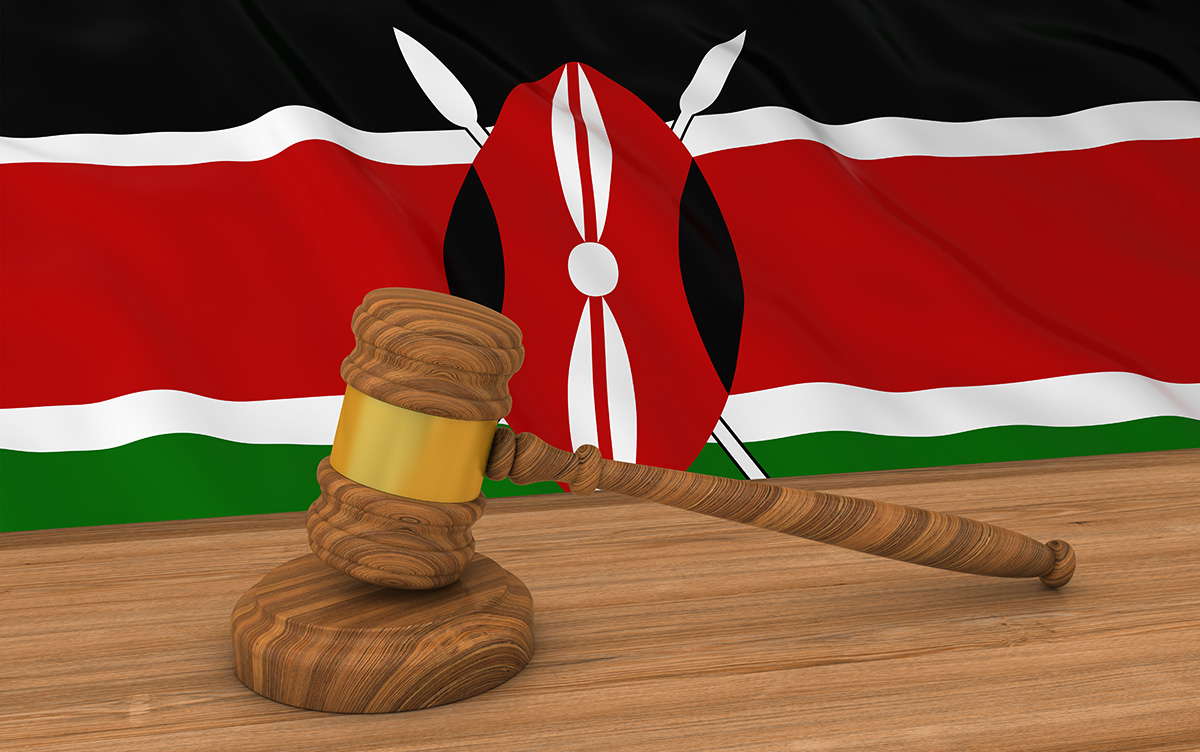
The queer community in Kenya can breathe a sigh of relief after a Mombasa court on Monday ruled clerics, politicians, and anti-LGBTQ groups cannot hold homophobic protests or engage in incitement.
The Mombasa High Court’s ruling, however, is temporary until July 24 when the court in Kenya’s second-largest city determines a petition on the issue.
Two petitioners — Mr. JM and the Center for Minority Rights and Strategic Litigation — last October sued Police Inspector General Japhet Koome for allowing religious leaders and lobby groups to hold homophobic protests whenever a court rules in favor of the LGBTQ community.
The petitioners’ effort to demand a ban on anti-LGBTQ protests in Kenya was in response to a series of homophobic demonstrations, particularly in Mombasa, after the Supreme Court last September affirmed an earlier decision that allowed the National Gay and Lesbian Rights Commission to register as an NGO.
Mombasa High Court Judge Olga Sewe in her Monday ruling also directed the petitioners and the respondents, who include Koome, two anti-LGBTQ activists and a national lobby group dubbed the “Anti-LGBTQ Movement” that organized protests, to file their witness lists and counter statements within 14 days of the July hearing.
“Pending the hearing and determination of this petition, this Honorable Court (does) hereby issue a conservatory order restraining the 2nd and 5th Respondents from calling on or inciting members of the public to carry out extra-judicial killing, lynching, punishing, stoning, forcible conversion, or any other means of harming LGBTQ+ identifying persons and their homes,” Sewe stated.
She also stopped the “Anti-LGBTQ movement,” Koome and any state agency from any attempted “expulsion from Kenya or any party of Kenya of LGBTQ+ identifying persons or closure of organizations serving LGBTQ+ identifying persons.”
The court’s directives come after the Center for Minority Rights and Strategic Litigation led a protest on April 11 against the “anti-LGBTQ Movement”‘s invasion of Mvita Clinic in Mombasa that “hateful misinformation” reportedly sparked because the facility also serves queer people.
“Mvita Clinic, like all healthcare providers, serves the entire community,” CMRSL stated. “Targeting them for LGBTQ+ inclusion is discriminatory and an attack on the basic right to health. Everyone deserves access to healthcare, and we urge an end to the spread of lies. Let’s promote inclusivity and ensure Mvita Clinic remains a safe space for all.”
CMRSL in response to Osewe’s ruling said it was a “major win for safety and equality in Kenya” because it allows the LGBTQ people to live with “greater peace of mind.”
The Initiative for Equality and Non-Discrimination, an LGBTQ rights group, meanwhile lauded the court’s decision as a reprieve to homophobic attacks on the queer community.
“There is some reprieve given the security incidents we witnessed during the protests on Sept. 15 last year,” INEND Communications Officer Melody Njuki told the Washington Blade.
“We had rescued LGBTQ+ folks in Mombasa, Kilifi, and Lamu, due to security incidents caused by the hatred the anti-LGBTQ movement mongered and the calling of violence towards people associated with the queer group and those identifying as members,” she added.
PEMA Kenya, a Mombasa-based gender and sexual minority organization, also applauded the court’s temporary injunction, describing them as timely in protecting the LGBTQ community against all forms of homophobic attacks.
“We welcome the ruling and we believe it will impact our members who for some time felt robbed of the freedom to express themselves,” PEMA Kenya director Ishmael Baraka told the Blade.
The Nature Network, a rights organization for refugees living in Kenya, also welcomed the Monday ruling which it termed “a positive step showing the courts’ commitment to upholding human rights for all.”
“Anti-LGBTQ Movement” Chair Salim Karama, however, declined to respond to the Blade’s questions about the ruling until determination of the petition’s status. He noted the organization is waiting for their lawyer to speak with them about the decision and the filing of counter statements that Sewe ordered.
As LGBTQ rights groups seek the queer community’s protection in Kenyan courts, parliament, on the other hand in is set to consider a petition that notes what it describes as the proliferation of homosexuality in the country.
National Assembly Speaker Moses Wetang’ula on Feb. 27 referred the petition to the relevant parliamentary committee for inquiry after MP Ali Mohamed, a member of the ruling party and a vocal LGBTQ rights opponent, presented it in the National Assembly, the lower house of the Kenyan parliament, on behalf of a group of more than 70 Kenyans and religious organizations opposed to homosexuality.
World
New World Bank US executive director: LGBTQ rights are human rights
Felice Gorordo assumed role last year
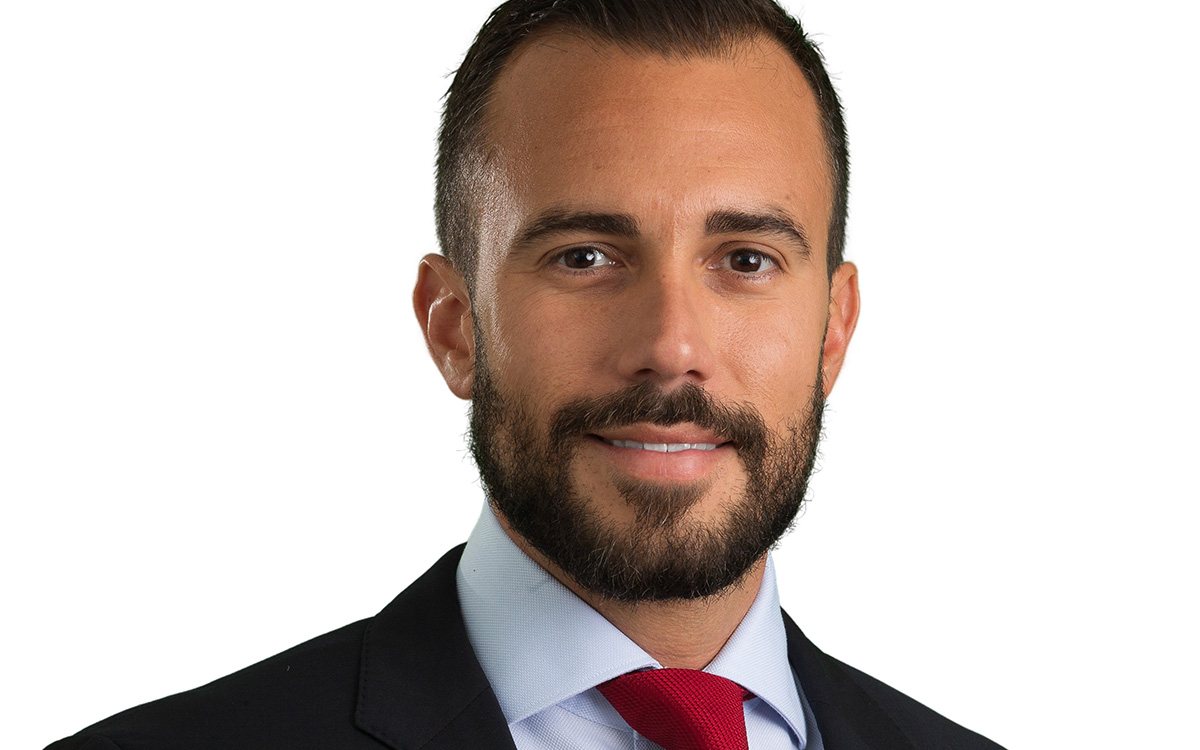
Acting U.S. World Bank Executive Director L. Felice Gorordo recently told the Washington Blade that he is committed to the advancement of LGBTQ and intersex rights within the multilateral organization.
“LGBTQI+ rights are human rights and human rights are LGBTQI+ rights. Period. Hard stop,” he said during an exclusive interview at his D.C. office on March 27. “I see it, personally, from a human rights promotion lens.”
Gorordo, a Cuban American who was born in Miami, graduated from Georgetown University in 2005.
He co-founded Roots of Hope, an organization that seeks to empower young Cubans on the island through entrepreneurship and increased access to technology.
Gorordo served in various roles in both the Obama and George W. Bush administrations, and served as advisor to then-Vice President Joe Biden’s cancer initiative after his mother died from pancreatic cancer.
He has also been the CEO of three-venture backed technology companies, an investor and advisor at two venture capital funds with focuses on global healthcare and infrastructure, and has sat on the boards of several for- and non-profit organizations. Gorordo was most recently the CEO of eMerge Americas and executive director of the Technology Foundation of the Americas before the U.S. Senate confirmed him in May 2023.
He has been the World Bank’s acting U.S. executive director since Adriana Kugler joined the Federal Reserve Board.
Gorordo, 41, throughout the interview referenced the Biden-Harris administration’s 2021 memo that committed the U.S. to promoting LGBTQ and intersex rights abroad as part of U.S. foreign policy.
“It starts off with us at the bank trying to build demand for the issues related to LGBTQI+ rights and people,” he said. “It’s about protecting LGBTQI+ rights in and outside of World Bank operations and projects and supporting LGBTQI+ people and rights inside and outside of our projects through inclusion. It’s using our voice and vote at every chance that we get to advance LGBTQI+ people.”
Gorordo pointed out his office reviews roughly 700 projects a year for the World Bank, and they have an average of $90-$100 billion in financial commitments. He said there is a “pretty extensive review process for due diligence” with criteria that include environmental and social frameworks and bank safeguards (that currently do not explicitly include sexual orientation or gender identity.)
“We take a critical lens at each one that it lives up to the values that we want to promote, and that includes looking at it through the lens of LGBTQI+ rights,” said Gorordo.
One LGBTQ-inclusive project is the World Bank International Finance Corporation’s $275 million loan to Banco Davivienda in Colombia, which provides funding for advisory services to LGBTQ and intersex people and for the design of LGBTQ and intersex banking products. The board in 2023 greenlighted $200 million for the Program for Universal Primary Healthcare Coverage and Resilience which, among other things, seeks to improve the quality of healthcare that LGBTQ and intersex people receive in Chile.
The World Bank’s EQOSOGI Project has already collected LGBTQ- and intersex-specific data on legal gaps as well as practices that impact LGBTQ and intersex people in 16 countries, and it plans to expand its work to other nations in 2024. The World Bank is also expanding its research on the economic costs of discrimination based on sexual orientation and gender identity.
The first studies focused on Serbia and North Macedonia, and found both countries’ annual gross domestic product would increase by .6 percent if LGBTQ and intersex people faced less discrimination in the workplace. A study that will focus on Brazil will be released later this year.
“There’s always more we can do,” Gorordo told the Blade. “What we believe we need to do, again, using our convening power and our voice and our vote is to help build because in the end we are still a demand-driven organization.”
“We need to use our research and the data, in my opinion, our opinion, to help generate the demand for LGBTQI rights to be enshrined in our safeguards, in our strategies and in every single one of our products and the data speaks for itself,” he added.
Gorordo also noted the bank in the coming months will release a new gender strategy that recognizes gender as nonbinary.
“That’s a big step,” he said.
Gorordo described World Bank President Ajay Banga as “a champion of the rights of all, including LGBTQI+ people.” Gorordo, however, acknowledged there has been “some pushback from certain constituencies that have different views and opinions than ours” on the new gender strategy and support for LGBTQ and intersex rights.
“I see it as my responsibility to not just advocate for it in the board room or with management, but also using my office and chair to meet with other chairs bilaterally, to make the case for it, to try and bring folks along with us,” he added.
Uganda’s Anti-Homosexuality Act ‘needs to be struck down and repealed’
The World Bank last August suspended new loans to Uganda in response to the country’s Anti-Homosexuality Act that President Yoweri Museveni signed.
Uganda’s Constitutional Court earlier this month refused to nullify the law. A group of Ugandan LGBTQ activists have appealed the ruling.
“The law needs to be struck down and repealed. Hard stop,” said Gorordo. “We continue to advocate for that.”
Then-World Bank President Jim Yong Kim in 2014 postponed a $90 million loan to the Ugandan government in response to Museveni’s decision to sign a nearly identical version of the Anti-Homosexuality Act, known as the “Kill the Gays” law that imposed a life sentence upon anyone found guilty of repeated same-sex sexual acts.
Uganda’s Constitutional Court later struck down the law on a technicality, but Kim’s decision to postpone the loan without first consulting the World Bank’s board sparked widespread criticism among board members. Advocacy groups had asked the World Bank not to fund future projects in Uganda, but they did not ask for the cancellation of existing loans.
The World Bank earlier this year organized a seminar with the Human Rights Promotion Forum of Uganda that upwards of 50 people attended virtually and in person.
“One of the things that I think is incredibly critical is hearing directly from those we seek to serve and who are being impacted by these discriminatory laws,” said Gorordo.
Gorordo said the World Bank in lieu of the law’s repeal has “been doing a review of mitigation efforts” that includes “a three-month trial period once there is an agreement of what those mitigation efforts would be, to see if they are fit for purpose.”
“At the crux of it includes the protection as well as the equal access of benefits for LGBTQ communities in Uganda. If it is not fit for purpose, then we have to go back to the drawing board., So we will continue to push for the strictest mitigation measures that can be put into place, a very critical review through that process … and ensuring that we are able to guarantee equal access and protection for the LGBTQ community.”
Ghanaian President Nana Akufo-Addo has delayed a decision on whether he will sign a bill that would further criminalize LGBTQ people in his country. Lawmakers in Kenya and Tanzania have proposed similar measures.
“One of the reasons why we’ve taken such a critical view of the Uganda case is this is potentially one of many of these types of cases that we’ll have to deal with,” said Gorordo. “What we do in Uganda could have a ripple effect in other countries and we need to ensure that we are setting the right precedents for how we react in these cases.”
Gorordo further noted consensual same-sex sexual relations remain criminalized in upwards of 60 countries around the world.
“The discrimination that’s against LGBTQI+ people is unacceptable across the board,” he said. “We will use all the tools in the U.S. government’s toolbox to be able to make it known our objection and to try and stop discrimination and protect the rights of LGBTQ+ people every chance we get.”



















